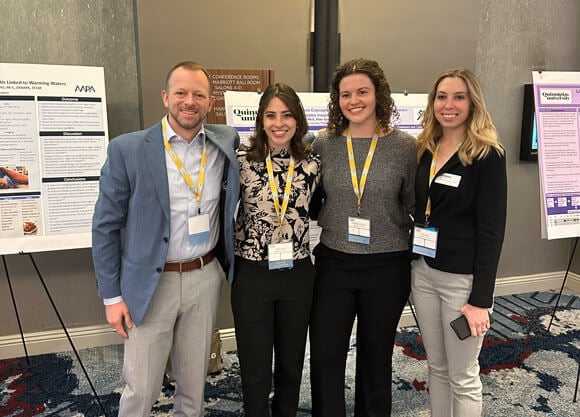
Physician assistant students present research posters at national conference
April 28, 2025

April 28, 2025

By attending the nation’s largest physician assistant conference, students are given an unparalleled opportunity to present their work to industry leaders, engage in meaningful dialogue with fellow physician assistants and take advantage of educational workshops and professional resources.
“We are very proud of our students. This is an excellent representation of the quality of our students that we have at the physician assistant program,” said Clinical Professor of Physician Assistant Studies and Coordinator of Clinical Education Sheree Piperidis. “They have gone above and beyond in their role as PA students with their medical research and writing. Their presence at a conference, as large as the AAPA enhances our visibility beyond Connecticut to a national platform and boosts the programs recognition.”
Presenting their research on a national stage, this opportunity is pivotal for influencing students' professional careers after graduation.
“This opportunity provides our students with exposure to PAs around the country, giving our students a national audience to share their work and build their confidence,” said Piperidis. “It helps students see themselves as contributors in their field. They have earned their chance to make an impact in medical research at such an early stage of their career, which is an incredible accomplishment.”
With Quinnipiac representing the majority of poster presentations, the sheer volume of student involvement reflects the values and goals of the program.
“One of the critical pillars in the School of Health Sciences is innovation,” said Interim Dean of the School of Health Sciences Jeff McCubbin. “Innovation requires creating and building new ideas and how to communicate what we know and what we need to know. It is essential for our students to adopt innovation in their educational settings."
Piperidis emphasizes the role of this participation in shaping the leadership skills and professional development of students.
“This platform encourages our students to engage in leadership, which is a strength of our program,” she said. “The university financially supports this endeavor, which cultivates future leaders within the student body and shapes them to be future leaders in the PA profession. The PA program recognizes that student presenters should be encouraged to present their work and be given a platform to promote their scholarship.”
In preparation for the national conference, several students presented their research at the ConnAPA Student Poster Presentation this past month.
The following students included:
Madeline Folsom '23, MHS ‘25: Giant Pelvic Schwannoma in the Setting of Renal Cell Carcinoma.
April Alver '23, MHS ‘25: Recurrent Craniopharyngioma Complicated by Panhypopituitarism and Diabetes Insipidus.
Kate Erler, MHS ‘25: Cold Agglutinin Disease with Severe Hemolytic Anemia Triggered by Mycoplasma Infection.
Joe Kaplowe, MHS ‘25: Emergence of Shewanella algae in Necrotizing Fasciitis Linked to Warming Waters.
Folsom is presenting a poster about a rare patient disease from her general surgery rotation, where she and her team surgically removed and diagnosed a pelvic schwannoma, a rare benign tumor composed of nerve cells called Schwann cells. Her poster includes both treatment and diagnostic challenges with these tumors, as well as the significance of the proposed genetic connection between pelvic schwannoma and renal cell carcinoma.
“I am passionate about surgery and truly have enjoyed my time spent in various surgical specialties throughout my clinical year,” said Folsom. “Being able to closely participate in this case was a valuable learning experience for me with such a rare patient presentation that I was inspired to share it with others.”
Folsom emphasized the honor of having her poster accepted for presentation at the conference.
“It was an incredibly rewarding feeling to learn that my poster was accepted to AAPA,” she said. “With all the hard work and long hours we put into rotations during the clinical year, there is a great sense of pride that comes with recognition of that hard work through being selected to present. I am very excited for the opportunity to share my experience with this patient case and learn from others at the national level.”
A vital contribution to the success of this research is the faculty mentorship at Quinnipiac.
“Students realistically could not build these scholarly projects without guidance and mentoring from our faculty,” said McCubbin. “As we find ways to enhance scholarship in our students and faculty, it is essential from the faculty to bring their expertise and experience in data collection, review and analysis. Faculty help create a thirst for lifelong learning, which is very important in our clinical health settings.”
The program’s dedication to mentorship and cultivating academic excellence is evident in its approach to medical writing, a vital skill needed to produce these research posters. Many of the medical writing instructors are well published in the medical field.
“The enthusiasm surrounding writing and publishing medical literature in our department are behaviors that encourage our students to get involved in medical writing," said Piperidis. “The PA faculty see the value in medical writing as a way of teaching students how to practice evidence-based medicine. The case poster assignment is a small aspect of our medical writing course where we teach students how to obtain, analyze and synthesize high-quality medical research."
Quinnipiac Today is your source for what's happening throughout #BobcatNation. Sign up for our weekly email newsletter to be among the first to know about news, events and members of our Bobcat family who are making a positive difference in our world.
Sign Up Now